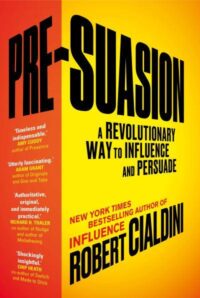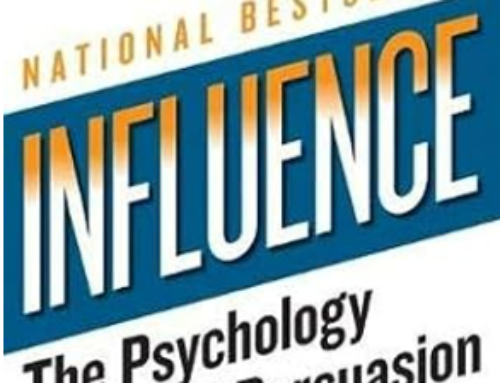Reading Notes for:


Pre-Suasion seeks to add to the body of behavioral science information that general readers find both inherently interesting and applicable to their daily lives. It identifies what savvy communicators do before delivering a message to get it accepted. Their sharp timing is what is new here.
Sun Tzu declared, “Every battle is won before it is fought.”
But there’s a drawback: days, weeks, or months of prior activity are required.
Communicators can elevate their success by knowing what to say or do just before an appeal.
PRE-SUASION: THE FRONTLOADING OF ATTENTION
PRE-SUASION
The highest achievers spent more time crafting what they did and said before making a request. They set about their mission as skilled gardeners who know that even the finest seeds will not take root in stony soil or bear fullest fruit in poorly prepared ground.
Of course, the best performers also considered and cared about what, specifically, they would be offering in those situations. But much more than their less effective colleagues, they didn’t rely on the legitimate merits of an offer to get it accepted; they recognized that the psychological frame in which an appeal is first placed can carry equal or even greater weight.
To accomplish that, they did something that gave them a singular kind of persuasive traction: before introducing their message, they arranged to make their audience sympathetic to it.
The best persuaders become the best through pre-suasion —the process of arranging for recipients to be receptive to a message before they encounter it.
An essential but poorly appreciated tenet of all communication: what we present first changes the way people experience what we present to them next. Consider how a small procedural difference has improved the bottom line of the consulting business of a Toronto-based colleague of mine. For years, when bidding on a big project, it wasn’t unusual to get price resistance from the client, who might propose a 10 percent or 15 percent reduction.
After his standard presentation and just before declaring his ($75,000) fee, he joked, “As you can tell, I’m not going to be able to charge you a million dollars for this.” The client looked up from the written proposal he’d been studying and said, “Well, I can agree to that!” The meeting proceeded without a single subsequent reference to compensation and ended with a signed contract.
My friend is not alone in experiencing the remarkable effects of merely launching a large number into the air and, consequently, into the minds of others. Researchers have found that the amount of money people said they’d be willing to spend on dinner went up when the restaurant was named Studio 97, as opposed to Studio 17;
And that observers’ estimates of an athlete’s performance increased if he wore a high (versus low) number on his jersey.
In fact, the impact of what goes first isn’t limited to numerics at all: customers in a wine shop were more likely to purchase a German vintage if, before their choice, they’d heard a German song playing on the shop’s sound system; similarly, they were more likely to purchase a French vintage if they’d heard a French song playing.

